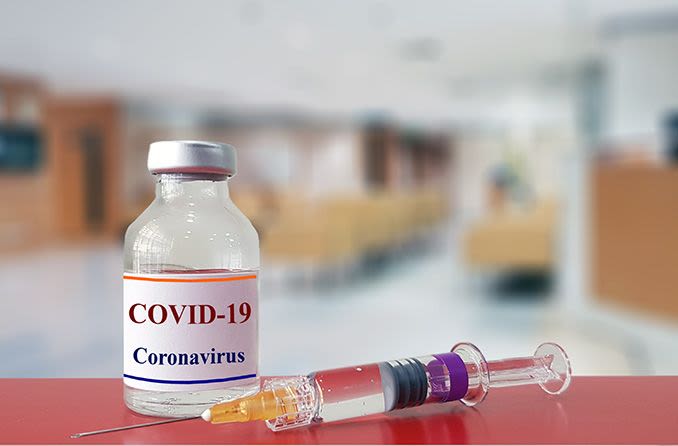Coronavirus Vaccine May Exist in Eye Disease Gene Therapy

A gene therapy to treat a rare eye disease could pave the way for a vaccine designed to combat the novel coronavirus, which causes the potentially fatal COVID-19 disease.
How a coronavirus vaccine may result from an eye disease gene therapy
In 2017, the U.S. Food and Drug Administration (FDA) approved Luxturna, the first gene therapy for reversal of a rare inherited retinal disease that can cause blindness. Researchers envisioned the therapy ultimately being used to treat other eye conditions, such as age-related macular degeneration (AMD).
Now, a gene-based vaccine related to Luxturna could be a weapon in the war against the novel coronavirus.
The experimental AAVCOVID vaccine is the work of a lab led by Luk Vandenberghe, associate professor of ophthalmology at Harvard Medical School and director of the Grousbeck Gene Therapy Center at the Massachusetts Eye and Ear specialty hospital in Boston.
Both Luxturna and AAVCOVID are fueled by the harmless adeno-associated virus (AAV).
SEE RELATED: The COVID-19 vaccine: Will it affect your vision?
How does this potential coronavirus vaccine work?
The AAVCOVID vaccine aims to prompt an immune response that prevents the novel coronavirus. Human trials of the AAVCOVID vaccine are expected to start later this year, according to a May 5 news release. Vaccine tests already have been conducted on mice.
AAV is the top gene-delivery vehicle for treatment of a variety of diseases, according to the Nature Reviews Drug Discovery journal. The FDA has approved two AAV-based drugs, including the gene therapy for the inherited form of blindness. But AAV has never been successfully employed to create a vaccine.
As The New York Times explains, the gene therapy technique conceived by Vandenberghe’s team “aims to make a person’s cells churn out proteins that will stimulate the body to fight the coronavirus.”
How is this coronavirus vaccine different from the rest?
“AAV is a superior technology for safe and efficient gene delivery, and the unique technologies we are applying in AAVCOVID support the potential for a potent immunity to be induced to [the novel coronavirus] from a single injection,” says Vandenberghe, a pioneer of viral gene transfer and therapeutic gene transfer procedures.
Gene therapy transplants normal genes into cells to replace missing or defective genes and fix genetic disorders.
In eye care, Vandenberghe’s research specialties include AMD, corneal problems and vision rehabilitation. One of the research missions of Massachusetts Eye and Ear is gene-based therapies for eye diseases such as retinitis pigmentosa and Usher syndrome, both of which can lead to vision loss.
How is this coronavirus vaccine being developed?
The multimillion-dollar AAVCOVID Vaccine Program, run by Massachusetts Eye and Ear along with Massachusetts General Hospital, launched in January 2020. More than 50 researchers are working on the project.
“In a crisis, we can harness the power of molecular biology and develop a draft of a vaccine in weeks, and that’s what was done here. Now, clinical studies are needed to establish safety and efficacy of our novel approach,” Vandenberghe says.
Fortunately, that approach is adaptable. The genetic code inside the AAVCOVID vaccine can be exchanged for an updated genetic code and processed into an updated vaccine within a few weeks, researchers say.
Jeffrey Marrazzo is co-founder and CEO of Philadelphia-based Spark Therapeutics, which manufactures and sells Luxturna. Three years ago, he hinted that his company’s gene therapy might someday contribute to fighting diseases like COVID-19.
Marrazzo said Luxturna represented “a first-of-its-kind breakthrough that may lay the groundwork for the development of gene therapies for other conditions that are not adequately addressed today.”
Among financial backers of the AAVCOVID vaccine project are millionaire Wyc Grousbeck, co-owner and CEO of the NBA’s Boston Celtics and chairman of Massachusetts Eye and Ear, and his wife, Emilia Fazzalari, CEO of Cinco Spirits Group.
Grousbeck told the Boston Globe that he has closely followed research at Massachusetts Eye and Ear for years, partly because his son, Campbell, is blind. Campbell was born with a rare retinal condition, Leber congenital amaurosis, that led to the complete loss of his sight.
Luxturna, the gene therapy that is the foundation of the experimental AAVCOVID vaccine, is the FDA-approved genetic treatment for Leber congenital amaurosis and, in some cases, retinitis pigmentosa.
Wyc Grousbeck and his family chipped in money for the AAVCOVID vaccine once they learned about Vandenberghe’s project.
“My wife and I wanted to do something to fight COVID-19, and we have total faith in Luk [Vandenberghe] and the quality of his team,” Grousbeck says. “We will need several vaccines to succeed to cure the world, and we’re trying to cure the world here.”
READ NEXT: Controversial use of ivermectin for treatment of COVID-19
Page published on Saturday, May 16, 2020
Medically reviewed on Monday, May 3, 2021




